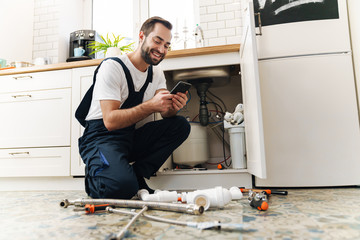Plumbing is a highly respected career that offers good wages, flexible hours and job satisfaction. It involves installing, repairing and maintaining water and drainage pipes, bathtubs and toilets.
 Valves and pipes are the unsung heroes of plumbing systems. They regulate the flow of water and prevent leaks. Regular maintenance and cleaning help reduce the risk of clogs. Visit https://www.plumbing-express.com/ to learn more.
Valves and pipes are the unsung heroes of plumbing systems. They regulate the flow of water and prevent leaks. Regular maintenance and cleaning help reduce the risk of clogs. Visit https://www.plumbing-express.com/ to learn more.
A clogged drain is one of the most common plumbing problems that homeowners face. Whether it’s a bathroom sink, shower, or tub that won’t drain, a stubborn clog can cause significant frustration and delay daily activities. However, there are a number of DIY techniques you can try before calling a plumber. From household items like baking soda to kitchen staples like vinegar, you can get rid of a blocked drain quickly without the risk of expensive and toxic chemicals.
The first step in clearing a clogged drain is to clear out any standing water. A clogged drain can breed bacteria and mold that will further aggravate the issue, so it’s important to remove any excess water as soon as possible.
Pouring a kettle of boiling water down the drain can help break up and dissolve any problem-causing buildup in the pipes. To do this, slowly pour the hot water down the drain in several stages, allowing each to work for a few seconds before continuing. It may take a few attempts to completely unclog the drain, and you may need to repeat this method two or three times.
Baking soda is a household staple that can effectively clean smelly and blocked drains by disintegrating organic buildup in the pipes. It’s also an effective alternative to harsh chemical drain cleaners. To use baking soda to unclog a drain, pour at least a cup of baking soda down the affected drain followed by an equal amount of white vinegar. The resulting reaction will create pressure on the clog, dissolving it and clearing the pipe.
You can further enhance this technique by adding a small amount of salt to the mixture. The abrasive nature of the salt will further scrub the pipes and eliminate any remaining clog. Once the clog has been removed, flush the drain with hot water to remove any remaining vinegar and baking soda residue. This simple and affordable homemade drain cleaner can be used on a regular basis to keep your home’s drains free from clogs and foul odors. In addition, it’s a good idea to install drain strainers in your home’s sinks and showers to catch hair, soap scum, food debris, and other potential clog-causing items.
Baking Soda and Vinegar
The vinegar-baking soda combination is often promoted as a quick home solution for dirty drains. Vinegar kills bacteria and the bubbling action of baking soda supposedly loosens clogs to wash away grime and grease. However, the acid in vinegar can also eat through pipes over time, leading to leaks and breakage. And the abrasive nature of baking soda can damage drain lines and over time, leading to more clogs and stinky, slow drains.
The chemistry behind the vinegar-baking soda reaction is simple. Baking soda is sodium bicarbonate, a base, and vinegar is made up of water and acetic acid, an acid. When the two chemicals mix, they create a chemical reaction that produces carbon dioxide gas and forms a fizzing effect that can help dislodge and break up food particles, hair, soap scum, coffee grounds, and other debris that may be contributing to a clogged drain or garbage disposal.
Before using this home remedy, remove the strainer or drain plug from your sink and inspect the drain for clogs or obstructions that can be easily removed. Pour the baking soda down the drain, and wait a few minutes before following it with the vinegar. The fizzing action created by the reaction helps to physically agitate the clog and breaks down organic clogs, while the carbon dioxide gas produced may help to dislodge tougher clogs such as mineral deposits.
This method is effective for most household clogs, including those caused by hair, grease, and paper products. However, it does not work as well on clogs that are formed from hard-to-break down materials like metal or stone. It is also less effective for clearing a blocked p-trap, which is the U-shaped fitting under each plumbing fixture that holds water to prevent sewer gasses from entering the home.
When used regularly, this home remedy can maintain clear drains and reduce the frequency of more serious clogs. It is best used as a supplement to regular professional drain cleanings, which can identify and treat the root cause of clogs to prevent them from reoccurring. For more information on maintaining clean, healthy drains, check out this article: Maintaining Your Drains: What You Need to Know.
Natural Drain Cleaners
Natural drain cleaners are an eco-friendly and health conscious alternative to chemical products. They may need a little more time to work, but they are gentler on pipes and safer for your home. They also tend to be more effective for routine maintenance and minor clogs.
One of the most common combinations is baking soda and vinegar, which can create an effervescent reaction that breaks up debris in your drains. This is especially useful for dissolving and cleaning grease. You can also use salt and Borax, which is even more effective for greasy drains. Simply coat the drain with a combination of one-fourth cup of salt and one-fourth cup of Borax, then pour half a cup of vinegar over it. This solution is safe for your pipes, as well as the environment, and it can be repeated as needed.
Lemon juice is another effective natural drain cleaner, with a fresh scent to boot. It can be used alone or in conjunction with boiling water to loosen clogs and eliminate bad odors. Lemons contain acids that can dissolve grease, grime, and hair, while promoting the growth of healthy bacteria in your pipes. You can also try a plastic drain snake, which is available at most supermarkets and dept. stores. This handy tool has hooks that latch onto clumps of hair and can break up tough blockages in your drains.
Another natural drain cleaner option is enzyme-based cleaners, which use organic components to breakdown organic waste buildup and promote healthy pipe function. They are non-corrosive, so they are safe for older pipes and septic systems, as well as the environment. They are also less expensive than chemical options, and they don’t require a special trip to the hardware store.
Regular maintenance using homemade solutions is a great way to keep your drains clear, but if you have a serious clog or can’t seem to get to the root of the problem, it might be time to call in Big B’s Plumbing for professional help. A professional will be able to use tools like a plumber’s snake to dislodge the clog and prevent it from returning in the future.
Plunger and Wire Hanger
While plunging a toilet with a quality plunger that fits the drain is a simple and effective solution, some clogs may require extra help. One quick hack is to use a wire hanger, but this technique must be used carefully. Expert plumbers warn that this method can damage pipes and increase the risk of a future blockage.
Begin by straightening a wire coat hanger, then wrapping it with a thin rag to avoid scratching the porcelain bowl. Then bend the hook end into a small hook shape and fish it down into the pipe. Once you have a good grip, twist and prod the hanger to break up or dislodge the clog. This method works best if there is some water in the bowl to flush away the gunk as it breaks up.
Be sure to wear rubber gloves as this is a dirty job. When the hanger is finished, discard or disinfect it to prevent spreading germs or bacteria. Also clean up the bowl, drain, and surrounding area. Then if necessary, mop or sanitize the bathroom to remove any residual water and any remaining debris from the toilet.
A final word of caution: This method can damage or crack pipes, and it cannot handle all types of clogs. If a clog persists, or if it is accompanied by a foul smell, contact a professional. A drain auger cable is an excellent tool for clearing stubborn clogs without damaging the pipes, and these can be found at most hardware stores.
While plunging and using a homemade wire hook are excellent solutions, some clogs can be too severe for DIY methods. If your clogged toilet or sink is overflowing, or if multiple attempts with a wire hanger and a plunger fail, it’s time to call for professional help. The plumbing experts at Allied Plumbing can use an electric snake or hydro jetting machine to clear your clogged pipe and return your home to normal. Then we can inspect your pipes to see if you have an issue that requires a professional repair. We are proud to offer a full range of residential and commercial plumbing services, including emergency service.


